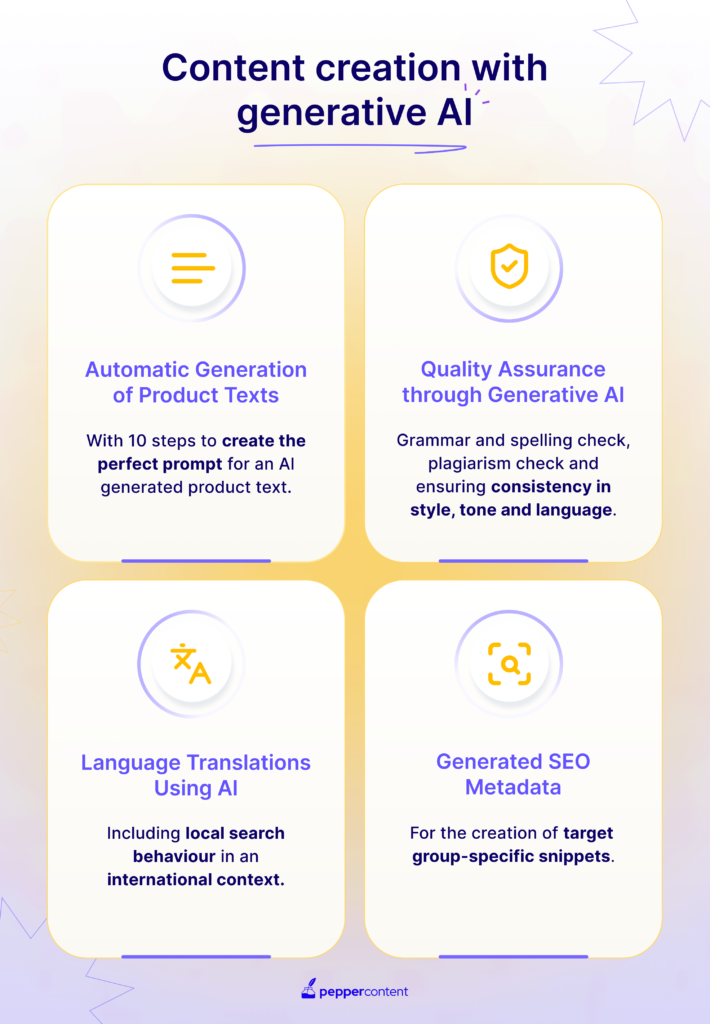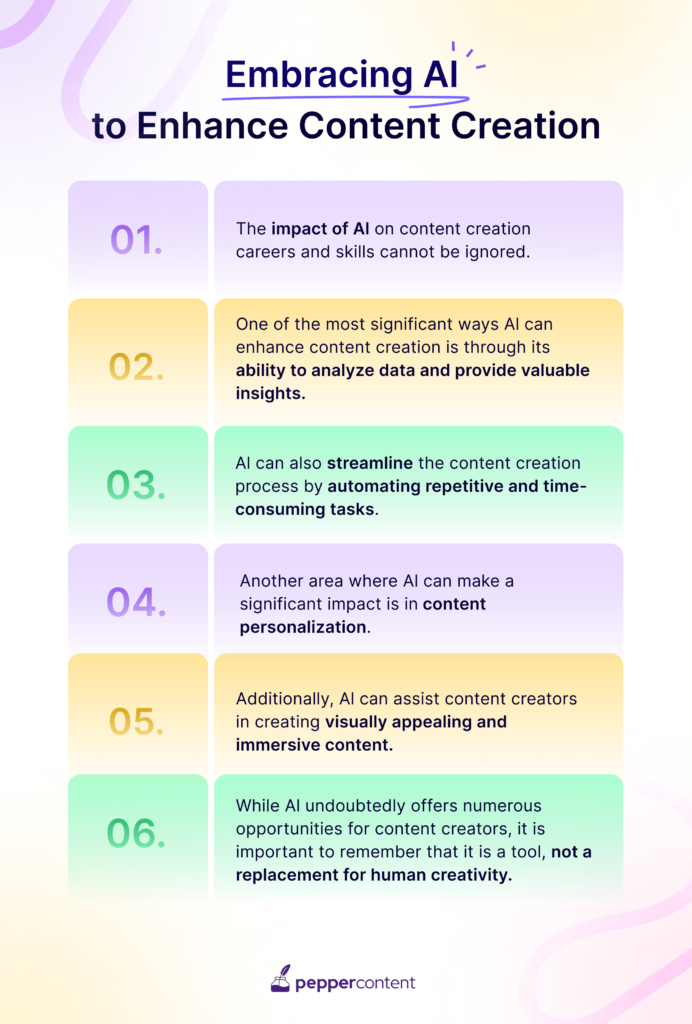How AI for Content Creation Can Refine Your Workflow

Content creation remains fundamental to engaging audiences, driving traffic, and building brand authority. As the demand for high-quality content grows, so does the need for tools to streamline the creation process. Enter AI for content creation—a solution to enhance your content output.
In this ultimate guide, we’ll explore the benefits of AI for content creation, delve into what is AI generated content, and offer tips to integrate these tools into your workflow for maximum efficiency.
Decoding AI for Content Creation
AI for content creation refers to the use of artificial intelligence technologies to automate various aspects of writing and producing content. These tools leverage natural language processing (NLP) and machine learning algorithms to generate text that mimics human writing. From drafting blog posts to creating social media content, AI in content creation redefines how we approach content marketing workflow. But what is AI-generated content? In simple terms, it is content produced by AI-powered tools, often requiring minimal user input. These tools analyze existing data, learn from it, and generate new content that is coherent, relevant, and tailored to your specific needs.

Why use AI for Content Creation?
1. Increased productivity: AI for content creation can significantly boost your content output by automating time-consuming tasks such as drafting, editing, and proofreading. This allows you to focus on more strategic aspects of content creation, like brainstorming and optimizing for SEO.
2. Consistency and quality: AI for content creation can maintain a consistent tone and style across your content, ensuring that your brand voice remains intact. Additionally, these tools are designed to produce high-quality content that meets specific criteria, reducing the likelihood of errors.
3. Cost-effective: Hiring a team of writers can be expensive. AI for content creation offers a more cost-effective solution, allowing you to produce large volumes of content without breaking the bank.
4. Scalability: Whether you’re a small business or a large enterprise, AI for content creation can help you effortlessly scale your content production. With AI, you can generate multiple pieces of content simultaneously, catering to various platforms and audiences.
When choosing an AI for content creation, it’s essential to understand the key features that make these tools effective. Here are some of the most important features to look for:
1. Natural Language Processing (NLP): NLP enables AI tools to understand and generate human-like text. This feature ensures that the content produced is coherent and engaging.
2. Customization options: Look for AI for content creation that allows you to customize the tone, style, and structure. This will help you maintain your brand’s unique voice.
3. SEO integration: Many of these tools come with built-in SEO features, ensuring that your content is optimized for search engines. This includes keyword placement, meta descriptions, and readability analysis.
4. Content templates: Some AI for content creation tools offer pre-designed templates for different types of content, such as blog posts, product descriptions, and social media updates. These templates can save you time and ensure consistency.
5. Support in multiple languages: If your audience is global, consider AI tools that offer multilingual support. This feature allows you to create content in different languages, expanding your reach.
How to Integrate AI for Content Creation into Your Content Strategy
Integrating AI into your content strategy requires careful planning and consideration. Here are some steps to help you get started:
1. Identify your content needs: Before you begin, assess your content needs. Determine the type of content you want to create, the frequency of publication, and the platforms you want to target.
2. Choose the right AI tool: With numerous AI tools available, it is crucial to select one that aligns with your content goals. Consider factors such as ease of use, customization options, and pricing.
3. Set clear guidelines: Establish clear guidelines for the AI-generated content. This includes defining the tone, style, and key messages you want to convey. Clear guidelines will help ensure that the AI-produced content aligns with your brand.
4. Monitor and edit: While AI can produce high-quality content, reviewing and editing the output is essential. Ensure that the content meets your standards and is free of errors or inconsistencies.
5. Analyze performance: Use analytics tools to track the performance of your AI-generated content. Assess metrics such as engagement, traffic, and conversion rates to determine the content’s effectiveness.
Common Misconceptions about AI-Generated Content
As AI for content creation gains popularity, several misconceptions have emerged. Let’s address some of the most common myths:
1. Myth 1: AI-Generated Content Lacks Creativity: While AI tools are designed to follow patterns and structures, they can still produce creative and engaging content. Many AI tools are equipped with features that allow users to inject creativity into the output.
2. Myth 2: AI Content is Not Unique: AI-generated content is created from scratch based on the input provided. It is not copied from existing sources, ensuring that the content is unique and original.
3. Myth 3: AI Will Replace Human Writers: AI is not here to replace human writers but to assist them. AI tools can handle repetitive tasks, allowing writers to focus on more complex and creative aspects of content creation.
4. Myth 4: AI Content is Full of Errors: Advanced AI tools are designed to minimize errors and produce high-quality content. However, it’s still essential to review the content for accuracy and relevance.
Trends in AI for Content Creation
1. Personalization: AI tools will become more adept at creating personalized content tailored to individual preferences and behaviors. This will enable brands to deliver more targeted and relevant content to their audiences.
2. Enhanced creativity: Future AI tools will likely have enhanced creative capabilities, allowing users to produce more innovative and compelling content. This includes the ability to generate multimedia content such as videos and infographics.
3. Improved collaboration: AI tools will facilitate better team collaboration by automating communication and content-sharing processes. This will streamline workflows and enhance productivity.
4. Ethical AI: As AI becomes more prevalent, there will be a greater emphasis on ethical considerations, such as ensuring transparency, avoiding bias, and protecting user privacy.
Practical Use Cases of AI for Content Creation

To better understand the potential of AI for content creation, let’s explore some practical use cases:
1. Blog post generation: AI can help you quickly generate blog posts on various topics. The AI tool can draft a complete blog post that is ready for publication by inputting a few keywords or a brief outline.
2. Social media content: AI tools can generate engaging social media content tailored to different platforms. Whether it’s a tweet, Instagram caption, or LinkedIn post, AI can help you maintain a consistent social media presence.
3. Email campaigns: AI can assist in crafting personalized email campaigns that resonate with your audience. From subject lines to body content, AI can optimize your emails for higher open and click-through rates.
4. Product descriptions: AI tools can generate compelling product descriptions that highlight the features and benefits of your products. This is particularly useful for e-commerce businesses with large inventories.
5. Content repurposing: AI can help you repurpose existing content into different formats, such as turning a blog post into an infographic or a podcast script. This allows you to maximize the value of your content.
Choosing the Right AI Tool for Your Needs
With so many AI tools available, selecting the right one can be challenging. Here are some factors to consider when choosing an AI for content creation.
1.Ease of use: Choose a tool with an intuitive interface that doesn’t require extensive technical knowledge. The easier it is to use, the faster you can integrate it into your workflow.
2. Customization: Look for a tool that offers customization options, allowing you to tailor the content to your needs.
3. Pricing: Consider your budget and choose a tool that offers good value for money. Some tools offer free trials, allowing you to test the features before committing.
4. Support and resources: Opt for a tool that provides excellent customer support and resources, such as tutorials and guides, to help you get the most out of the software.
With AI for content creation, you can increase productivity, maintain consistency, and scale your content efforts. As AI technology continues to evolve, the possibilities for content creation are endless. Embrace the future of writing with AI for content creation, and watch your content output soar.
Take your content creation to the next level. Book a demo with Pepper’s Content Marketing Platform and test it today!
Latest Blogs
Learn how to rank on AI search engines like ChatGPT, Perplexity, and Gemini by optimizing your content for authority, structure, and relevance. Stay ahead in AI-driven search with this strategic guide.
Explore the best healthcare SEO services for your medical practice. Improve online visibility and effectively reach more patients in need of your services.
Discover top social media agencies specializing in banking solutions, enhancing financial services and driving engagement.
Get your hands on the latest news!
Similar Posts
Artificial Intelligence
3 mins read
How to Rank on ChatGPT, Perplexity, and Gemini: A Strategic Guide for Marketers

Artificial Intelligence
5 mins read
How Free AI Tools for Content Creation Can Boost Your Content Strategy

Artificial Intelligence
5 mins read